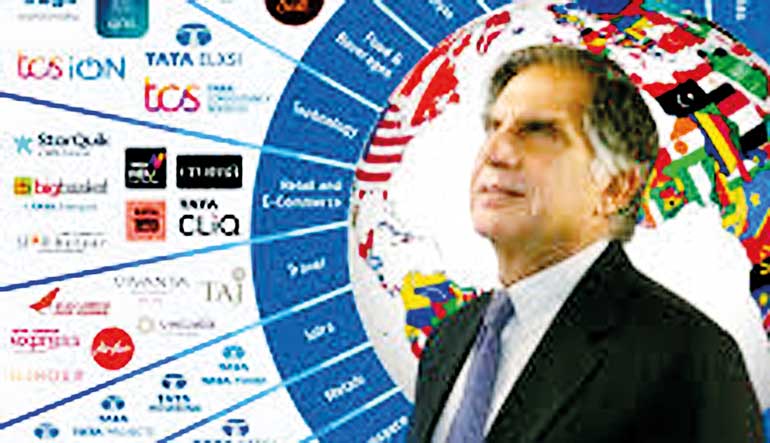Friday Feb 20, 2026
Friday Feb 20, 2026
Friday, 25 October 2024 00:10 - - {{hitsCtrl.values.hits}}

The empire Ratan built for Tata
 Introduction
Introduction
Ratan Tata, one of India’s most respected industrialists and philanthropists, was widely celebrated for his transformational leadership at the Tata Group. His passing on 9 October 2024, marked the end of an era. I had the good fortune of meeting Ratan Tata twice, and the impressions that stand out are his noble and patriarchal demeanour. Under his leadership, the Tata Group expanded by investing in diverse industries, effectively diversifying the risk for the entire conglomerate.
His deep commitment to the Tata legacy of serving the country was reflected in his insistence on allocating a significant portion of profits to social causes, particularly those benefiting the poor. His career, marked by bold decision making, high ethical standards, and visionary thinking, offers numerous leadership lessons. Here are my 5 key insights from Ratan Tata’s remarkable journey.
Sense of purpose
One of Ratan Tata’s defining leadership traits was his profound sense of purpose. Throughout his tenure as Chairman of Tata Sons, he emphasised that businesses should not merely focus on profit but should also contribute to a larger societal good. Under his leadership, the Tata Group became synonymous with corporate social responsibility, philanthropy, and ethical governance.
This purpose-driven approach was exemplified in initiatives like the Tata Nano project, which aimed to provide affordable cars for India’s middle class. Although the project encountered market financial challenges, it was born from a commitment to solving societal problems and improving people’s lives. Tata’s leadership highlights that businesses driven by a sense of purpose are more likely to endure and become sustainable enterprises.
Risk-taking and resilience
Ratan Tata’s career is distinguished by his willingness to take bold risks. One of his most iconic moves was the acquisition of Jaguar Land Rover in 2008, at a time when many doubted Tata Motors’ ability to turn around the struggling luxury brands. Under his leadership, Jaguar Land Rover not only survived but thrived, becoming one of the most profitable divisions of Tata Motors.
The leadership lesson here is clear: great leaders are not afraid to take calculated risks. They look beyond short-term obstacles and focus on long-term value. Tata’s career also exemplifies resilience. Whether faced with financial challenges, market competition, or setbacks like the struggles of the Tata Nano project, he remained firm under pressure and adaptable. His perseverance, especially during difficult times, illustrates the importance of staying committed to one’s vision even in the face of adversity.
Humility and approachability
Despite his immense success and wealth, Ratan Tata was known for his humility and approachability. He maintained an open-door policy and engaged with employees at all levels, fostering a culture of respect and trust within the organisation. Tata never allowed his position to alienate him from the people who kept the business running, valuing input from all, whether senior executives or junior staff.
This sense of humility is a hallmark of true leadership. Tata demonstrated that successful leaders do not need to rely on authority or status. Instead, they achieve greater influence by building talent pools, fostering collaboration and creating an inclusive environment where every team member feels valued.
Strong work ethics
Ethical leadership was central to Ratan Tata’s business philosophy. Throughout his career, Tata prioritised integrity, honesty, and fairness, ensuring that the Tata Group operated with the highest ethical standards. His belief in balancing profit with social responsibility helped establish Tata as a global symbol of trust and credibility.
Tata’s ethical approach is a powerful reminder that the most impactful leaders build legacies through their actions. His commitment to standing by his principles, even in challenging times, underscores the importance of leading with values rather than compromising for short-term gain.
Empowering others
Ratan Tata was a strong advocate for empowering the next generation of leaders. Even after retiring as chairman, he continued mentoring and supporting entrepreneurs, particularly in India’s start-up ecosystem. His guidance and investment in start-ups reflect his belief that leadership is not about individual achievement but about enabling others to reach their full potential and the world a better place.
Conclusion
The key takeaway was that Ratan Tata’s leadership was defined by vision, humility, ethics, risk-taking, and resilience. His lessons will certainly be timeless and memorable: leaders must serve a higher purpose, embrace risk, act with integrity, lead courageously, and empower others. By following these principles, Ratan Tata not only built a successful business empire but also left a legacy that will inspire business leaders worldwide for generations.
References:
https://www.youtube.com/watch?v=uKkk9dW2d7M
https://www.businesstoday.in/amp/magazine/cover-story/story/ratan-tatas-undying-legacy-how-one-man-transformed-the-tata-group-into-a-global-business-empire-450366-2024-10-16